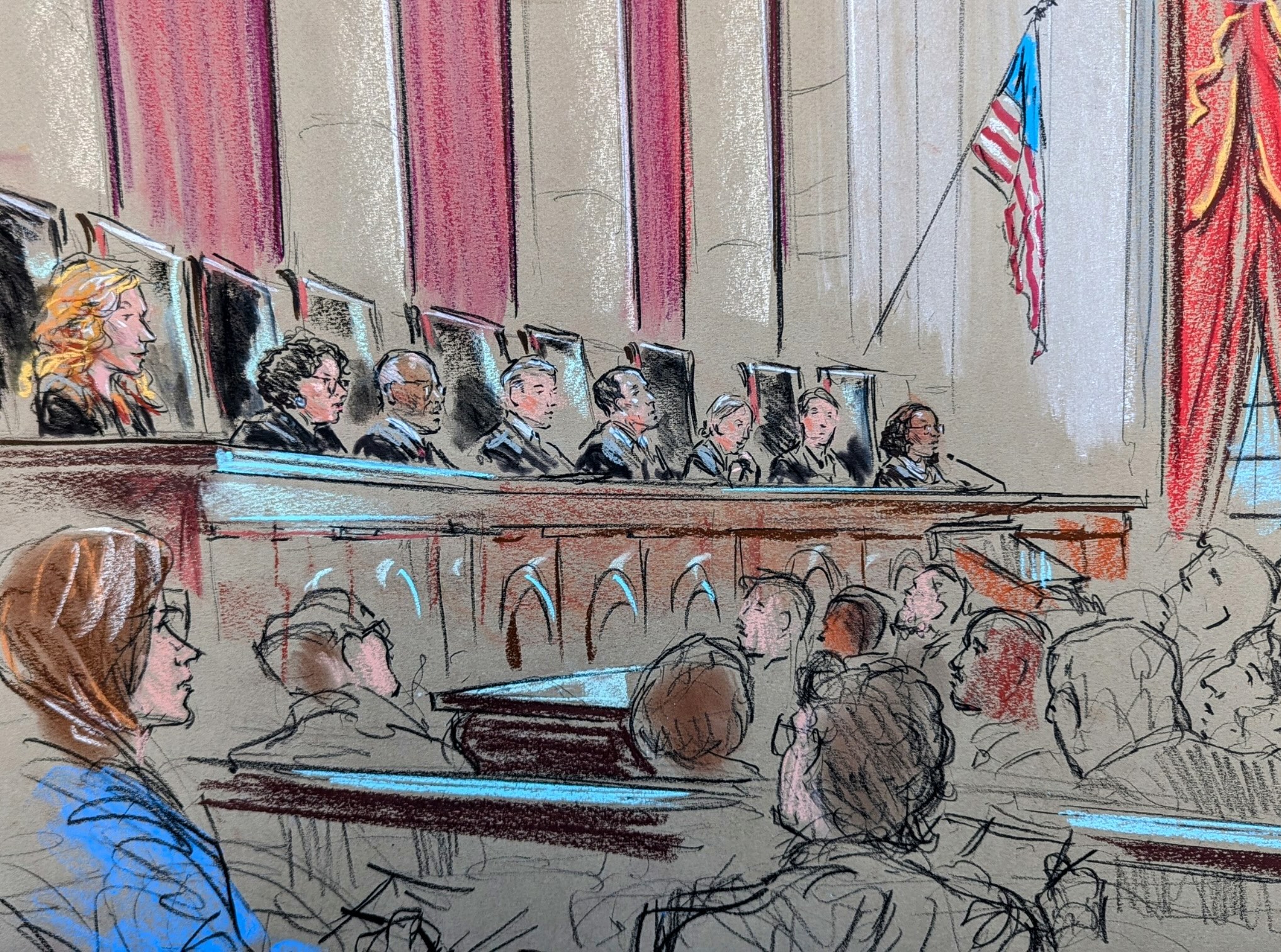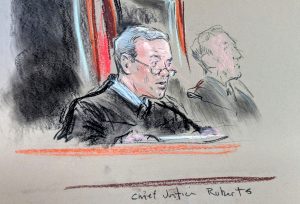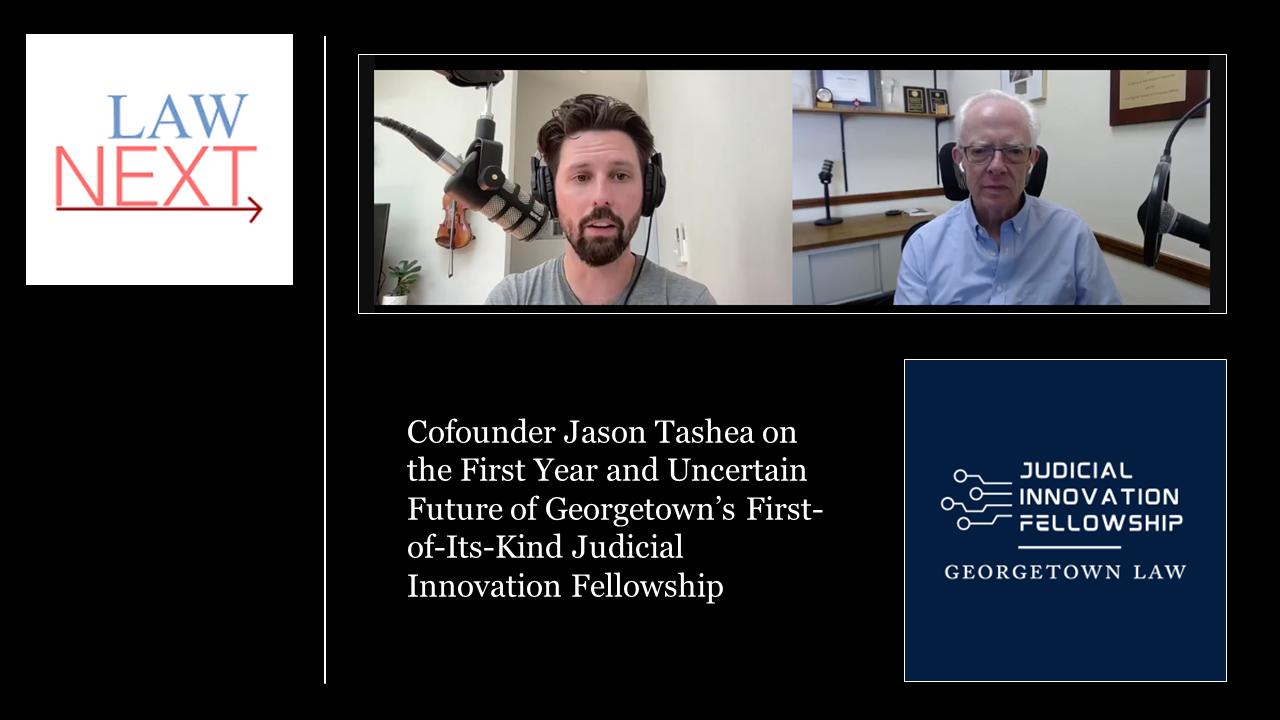View from the court
on Jul 1, 2024
at 4:07 pm

The court released the final opinions of the 2023-24 term on Monday, including a historic decision in Trump v. United States. (William Hennessy)
As I reach the courtroom on Monday, Michael Dreeben of Special Counsel Jack Smith’s office has already taken a seat in the bar section. He can be pretty sure he will get the opinion in Trump v. United States today. Smith, who was present for oral arguments in late April, is not here today. I don’t see John Sauer, who argued the case for former President Donald Trump either.
At about 10:50 a.m., Ashley Kavanaugh, Justice Brett Kavanaugh’s wife arrives, along with one of their daughters and the justice’s parents, Everett and Martha Kavanaugh. A few minutes later, Jane Roberts, Chief Justice John Roberts’s wife, arrives and takes her seat in the VIP box.
This is the one day we know which decisions are coming, and when the justices take the bench (except Justice Neil Gorsuch, who is absent again today without explanation), Roberts announces that Justice Amy Coney Barrett has the opinion in perhaps the least anticipated of the three outstanding cases, Corner Post v. Board of Governors of the Federal Reserve System.
“Sorry, this is not one of the cases you’re waiting to hear, so I’ll make this concise,” Barrett says, to a few laughs from the crowded public gallery. She explains the holding that the North Dakota convenience store’s lawsuit against the Fed over interchange fees for debit card transactions was not time-barred under the default six-year federal statute of limitations.
Barrett is indeed relatively succinct. Justice Ketanji Brown Jackson follows her, reading from her dissent to tell us why this case is one everyone should care about. It is her second oral dissent of the term.
Allowing every new commercial business to bring fresh facial challenges under the Administrative Procedure Act to long-existing federal regulations could be “profoundly destabilizing for both government and businesses,” Jackson says. “The flawed reasoning and far-reaching implications of today’s ruling in this case are staggering.”
She says it will be “open season” for challenges to years-old regulatory decisions, such as the Food and Drug Administration’s approval of the abortion drug mifepristone or the Bureau of Alcohol, Tobacco, Firearms and Explosives’ limitations on federal firearms licensees selling their wares at out-of-state gun shows.
“After today, even the most well-settled agency regulations can be placed on the chopping block.
Justice Elena Kagan is up next with the consolidated cases of Moody v. NetChoice and Netchoice v. Paxton, about Florida and Texas laws seeking to regulate social media companies and other internet platforms’ content moderation.
Kagan provides a fairly thorough summary of her opinion in these important cases, but the outcome is somewhat muted. The court is sending both cases back to their respective courts of appeals for closer analysis of the facial First Amendment challenges. The court does provide some important First Amendment guidance, as well as the strong suggestion that Texas’s law is unlikely to pass constitutional muster. But the decision will struggle to get much media attention compared with what is coming next.
It is now 10:28 a.m., and the chief justice says, “I have the opinion of the court in No. 23-939, Trump v. United States.”

Chief Justice John Roberts speaks from the bench on Monday. (William Hennessy)
Roberts got criticism for what some perceived as his relatively brief and antiseptic description of the events of Jan. 6, 2021, in his majority opinion in Fischer v. United States the other day. Today, his opinion and his bench summary provide a bit more detail, he explicitly lays out how Trump’s supporters “stormed the Capitol and disrupted the proceeding” to certify the 2020 election results.
He notes that this is the first time the court has been confronted with the question of whether a former president is immune from criminal prosecution and begins to detail the broad constitutional duties of the president. But Roberts quickly pivots to Nixon v. Fitzgerald, the 1982 decision that the president is immune from civil liability for official actions while in office. With that, it has become clear that this is not going to be a strong ruling in favor of the prosecution.
The president is absolutely immune from prosecution for his conduct within his exclusive sphere of constitutional authority, the chief justice says, including things like pardons and appointing ambassadors. And separation of powers principles necessitate at least a presumption of immunity from criminal prosecution for a president’s acts “within the outer perimeter of his official responsibility.”
And when it comes to unofficial conduct, “there is no immunity,” Roberts says. “The president is not above the law.”
Dreeben is intently jotting notes as the chief justice speaks.
Roberts goes on to explain why the case is being sent back to the courts below for closer analysis of some of the allegations and whether they amount to unofficial acts, while the opinion characterizes some of Trump’s interactions, such as with then Vice President Mike Pence, as categorically official.
He addresses some of the forthcoming points of the dissent, but soon pivots back to his central conclusion that while no president is above the law, the court’s decision is meant to apply to all presidents and not any one defendant.
The president “is entitled, at a minimum, to a presumptive immunity from prosecution for all his official acts,” Roberts says. “That immunity applies equally to all occupants of the Oval Office, regardless of politics, policy, or party.”
Justice Sonia Sotomayor follows Roberts with her third dissent from the bench of this term.
“Saying it is so doesn’t make it so,” she ad libs as an opener, before quoting her written dissent.
“Today’s decision to grant former presidents criminal immunity reshapes the institution of the presidency,” she says in a dissent joined by Kagan and Jackson. “It makes a mockery of the principle, foundational to our Constitution and system of government, that no man is above the law.”
“[T]he court gives former President Trump all the immunity he asked for and more,” she adds. “Remember the indictment? It paints a stark portrait of a president desperate to stay in power.”
Sotomayor speaks for 25 minutes, vividly describing the majority as “invent[ing] immunity through brute force” and the official-acts immunity as “utterly indefensible.”
“This new official-acts immunity now lies about like a loaded weapon for any president that wishes to place his own interests, his own political survival, or his own financial gain, above the interests of the nation,” Sotomayor says.
“With fear for our democracy, I, along with Justice Kagan and Justice Jackson, dissent,” she says, notably leaving out “respectfully” in her written and oral statements.
With that, it is time to for the term to wrap. Roberts begins his traditional statement meant to thank the court’s work force but has a slip of the tongue.
“On behalf of my employees,” he says before catching himself: “My colleagues!” The tension in the courtroom is broken by a wave of laughter at this small slip. It reminds me of a similar time, in 2015, when Justice Antonin Scalia followed the tense reading of a dissent (by Roberts) in Obergefell v. Hodges with the news that there was one more opinion to announce. “Don’t go away!” Scalia deadpanned.
Roberts meant to say that on behalf of his colleagues, he was thanking court employees for their dedication and service. In a longstanding tradition, six employees who retired within the last year get to sit in the front row of the VIP section and be recognized by the chief.
They include police officer Brian Porter, Kimberly Kiely of the library, Janimel Scott and John Kouros of the marshal’s office, and Clayton Higgins of the clerk’s office. Roberts singles out curator Catherine Fitts, who retired in December after 37 years of Supreme Court service (and was well-liked throughout the building) for a little extra recognition for her “tireless efforts to record and preserve the history of the court.”
Marshal Gail Curley bangs her gavel, the justices and the spectators rise, and another momentous term comes to an end.





